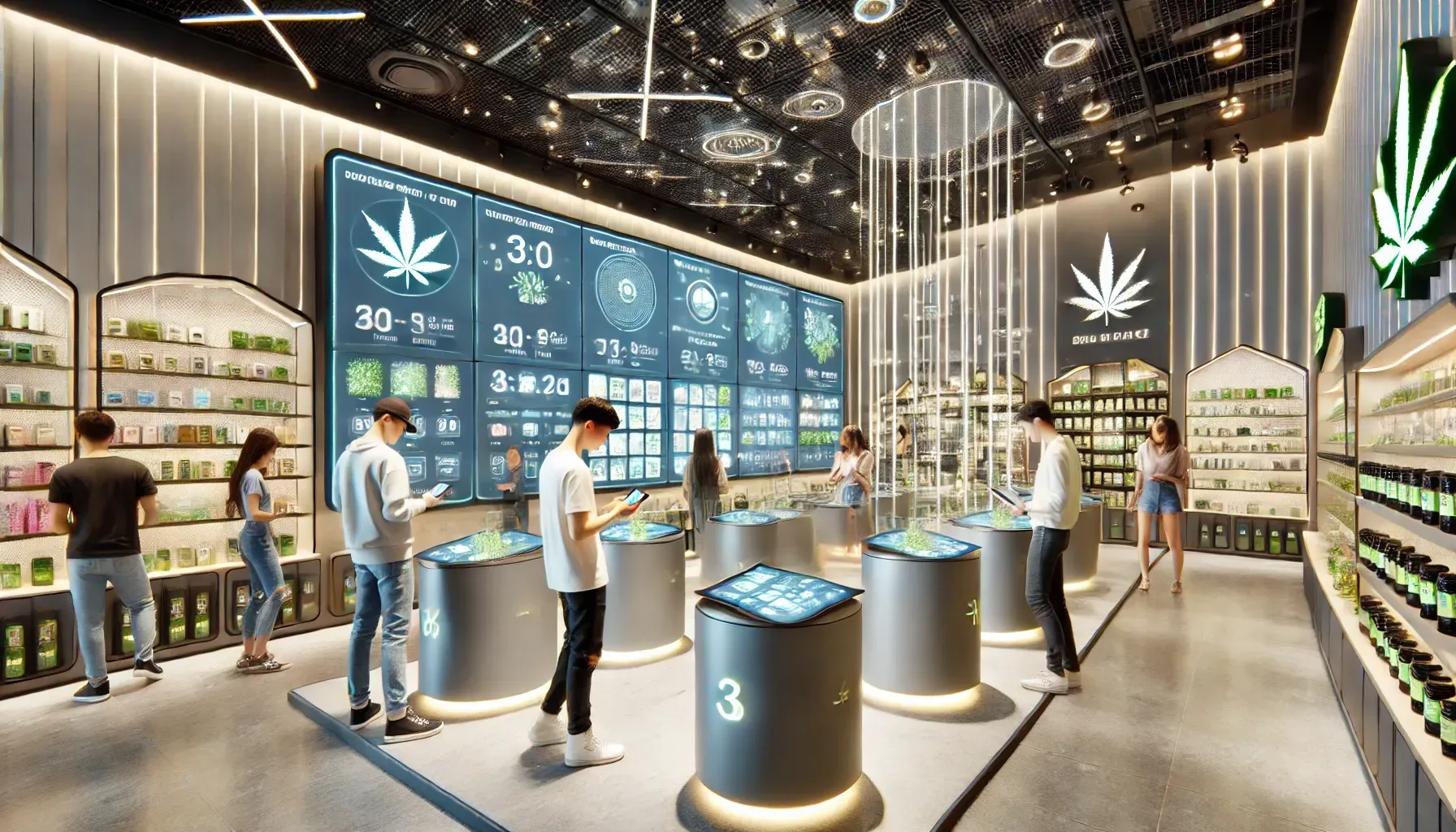
The Future of Cannabis Retail: Trends and Predictions for 2025
Predictions For 2025

The cannabis industry is rapidly evolving, and retail is at the forefront of this transformation. As legalization spreads and the market matures, new trends are emerging that will shape the future of cannabis retail. By 2025, we can expect significant changes driven by technology, consumer preferences, regulatory developments, and market dynamics. This comprehensive analysis explores these trends and offers predictions for the future of cannabis retail.
Technological Advancements: Enhancing Customer Experience
Technology is playing a crucial role in redefining cannabis retail. One notable advancement is the integration of AI and machine learning to personalize customer experiences. Companies like Dutchie and Jane Technologies are leading the way by offering platforms that use AI to recommend products based on individual preferences and purchasing history. Dutchie's platform, for example, has reported a 20% increase in average order value for retailers using its AI-driven recommendations.
Another significant technological trend is the use of blockchain for supply chain transparency. Treum, a blockchain company, collaborates with cannabis retailers to provide end-to-end product traceability, ensuring consumers can verify the authenticity and quality of their purchases. This transparency is becoming increasingly important as consumers demand more information about the products they consume.
E-commerce and Delivery: Convenience is King
The COVID-19 pandemic accelerated the adoption of e-commerce and delivery services in the cannabis industry. By 2025, online sales are expected to account for a substantial portion of the market. According to a report by Arcview Market Research and BDS Analytics, online cannabis sales in North America are projected to reach $15 billion by 2025, up from $5.8 billion in 2020 .
Companies like Eaze and Leafly have capitalized on this trend by offering seamless online ordering and delivery services. Eaze, for instance, saw a 71% increase in first-time deliveries during the pandemic. As regulations continue to evolve, more states are likely to permit online sales and delivery, further boosting this segment of the market.
In-Store Experience: Creating a Destination
While e-commerce is growing, the in-store experience remains a vital component of cannabis retail. Retailers are focusing on creating immersive and educational environments to attract customers. MedMen, a prominent cannabis retailer, has revolutionized the in-store experience by designing their locations to resemble high-end Apple stores, complete with interactive displays and knowledgeable staff.
In addition to aesthetics, education is a key aspect of the in-store experience. The Green Solution, a Colorado-based retailer, offers educational sessions and personalized consultations to help customers make informed decisions. This approach has resulted in higher customer satisfaction and increased loyalty.
Sustainability: Meeting Consumer Demand
Sustainability is becoming a significant factor in consumer purchasing decisions. A survey by New Frontier Data found that 58% of cannabis consumers prefer eco-friendly products . Retailers are responding by adopting sustainable practices and offering products with minimal environmental impact.
Companies like Flow Kana and Cresco Labs are leading the charge in sustainability. Flow Kana partners with small, craft farmers who use organic and sustainable cultivation methods. Cresco Labs, on the other hand, has committed to reducing its carbon footprint by implementing energy-efficient technologies and sustainable packaging solutions.
Regulatory Changes: Navigating the Landscape
Regulatory developments will continue to shape the future of cannabis retail. As more states legalize cannabis for medical and recreational use, the industry will face new challenges and opportunities. Retailers must stay informed and adaptable to navigate the complex regulatory landscape.
One significant regulatory trend is the push for social equity programs. States like Illinois and Massachusetts have implemented initiatives to ensure that communities disproportionately affected by the war on drugs have opportunities to participate in the legal cannabis market. Green Thumb Industries has been proactive in supporting social equity applicants by providing funding and resources to help them establish their businesses.
Product Diversification: Catering to Diverse Consumer Preferences
The cannabis market is diversifying, with new products catering to a broader range of consumer preferences. Edibles, beverages, topicals, and concentrates are becoming increasingly popular. According to BDS Analytics, edibles alone are projected to account for 14% of the total cannabis market by 2025, up from 11% in 2020 .
Companies like Kiva Confections and Cann are at the forefront of product innovation. Kiva Confections offers a wide range of edibles, including chocolates and gummies, that appeal to both novice and experienced consumers. Cann, known for its low-dose cannabis-infused beverages, has gained popularity for providing a controlled and social cannabis experience.
Brand Loyalty and Differentiation: Standing Out in a Crowded Market
As the market becomes more competitive, brand loyalty and differentiation will be crucial for success. Building a strong brand identity and fostering customer loyalty will help retailers stand out. Cookies, a well-known cannabis brand, has successfully differentiated itself by focusing on unique strains and a strong brand presence. Their strategy includes collaborations with artists and influencers, creating a sense of community and exclusivity around their products.
Data-Driven Insights: Optimizing Operations and Marketing
Data analytics is becoming increasingly important in optimizing retail operations and marketing strategies. Retailers are leveraging data to understand consumer behavior, optimize inventory management, and enhance marketing efforts. Headset, a cannabis data analytics company, provides valuable insights to retailers, helping them make informed decisions. By analyzing sales data, Headset can predict trends and identify opportunities for growth.
Health and Wellness Focus: Expanding the Consumer Base
The health and wellness trend is expanding the cannabis consumer base. Products marketed for their therapeutic benefits are attracting new demographics, including older adults and wellness enthusiasts. Charlotte's Web, a leading CBD brand, has successfully tapped into this market by promoting the health benefits of its products. Their focus on quality and transparency has helped build trust and attract a loyal customer base.
Global Expansion: Tapping into International Markets
As cannabis legalization spreads globally, new markets are emerging. Countries like Canada, Germany, and Israel are leading the way in medical cannabis, while others are exploring recreational legalization. Aurora Cannabis and Canopy Growth are two Canadian companies that have expanded internationally, establishing a presence in multiple countries. By 2025, the global cannabis market is projected to reach $73.6 billion, according to Grand View Research .
Conclusion
The future of cannabis retail is dynamic and full of opportunities. By embracing technological advancements, enhancing the customer experience, prioritizing sustainability, and navigating regulatory changes, retailers can position themselves for success. Product diversification, brand loyalty, data-driven insights, and a focus on health and wellness will further drive growth and innovation. As the industry continues to evolve, those who stay ahead of these trends will thrive in the competitive cannabis market of 2025. At Terra Vita Holdings, we stay ahead of these trends to provide our clients with the insights and tools they need to succeed in the ever-evolving cannabis retail market. Visit our website to learn more about how we can help your business thrive.
References
- Arcview Market Research and BDS Analytics. (2021). State of Legal Cannabis Markets.
- New Frontier Data. (2021). Cannabis Consumer Survey.
- BDS Analytics. (2020). Cannabis Product Sales and Trends.
- Grand View Research. (2020). Cannabis Market Size, Share & Trends Analysis Report.
- Headset. (2021). Cannabis Industry Data and Analytics.









